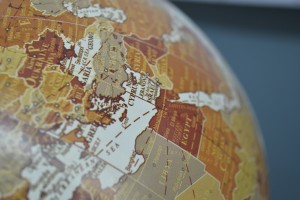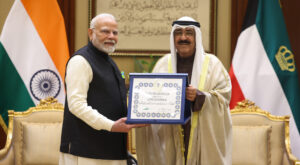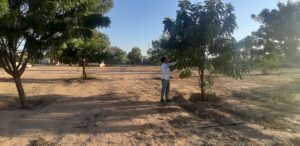
Spotlight
 By Deepak Parvatiyar
By Deepak Parvatiyar
As the conflict in Syria completes a decade on March 15, 2021, it has been the biggest failure of the United Nations in recent times. With no solution to end the conflict, the world remains divided over the war- ravaged country, which has become a playing field for the superpowers.
The High Commissioner for Human Rights, Michelle Bachelet, said today that as Syria is about to enter its eleventh year of violence and conflict, the pursuit of truth, justice and reparations for victims must be stepped up. She said that the violence that spiralled into an armed conflict had left hundreds of thousands of Syrians dead, millions displaced both within and outside the country, and many Syrian families struggling to establish the truth of what happened to their loved ones.
But can a solution be hammered out to end the crisis? Today’s development in Doha does offer some hope. Here the Foreign Ministers of Russia, Qatar and Turkey issued a statement about Syria, in a move to promote a political solution to Syria’s 10-year conflict.
This was the first time perhaps that Qatar got engaged into these efforts to find a regional settlement of the Syrian issue, and Russia clarified that the new trilateral consultation process was not meant to replace efforts which Turkey, Russia and Iran had jointly been making since 2017 to reduce fighting in Syria and discuss a political solution. The United Nations Secretary-General’s secretariat stated that it encouraged all regional groups, all concerned nations to cooperate and do what they can to bring the conflict in Syria to an end.
“Our goal is to discuss how we can contribute to efforts towards a lasting political solution in Syria,” Turkish Foreign Minister Mevlut Cavusoglu said.
It is interesting to note that while Turkey and Qatar had backed fighters who sought to topple Syrian President Bashar al-Assad, Russia had provided military support to Assad seize to quell the rebellion. So is today’s development beginning of the end of the conflict is Syria?
In Syria the Ba’ath Party government has been fighting against people who want to remove this government. The conflict had started on March 15, 2011, with demonstrations. Its trigger point was the Arab Spring in Egypt, that had ignited the civil war in Syria, even as many complicated motives led to the Syrian civil war. Thereafter, the Syrian government received military support from Russia and Iran. By September of 2013, at least 120,000 Syrians were killed. In 2013, the Syrian regime even used chemical weapons against the rebels, which had made the then US President Barack Obama remark that the US could not “turn a blind eye” to the use of chemical weapons in Syria. The US went on to accuse Syrian President Bashar al-Assad’s forces of killing 1,429 people in a poison gas attack on August 21, 2013.
However, on March 4, 2021, nearly eight years after the Security Council first mandated the destruction of Syria’s chemical weapons programme, a senior United Nations disarmament official, High Representative for Disarmament Affairs, Izumi Nakamitsu, told UN Security Council in New York that Syria’s chemical weapons declaration could not be considered “accurate, complete”. She said evidence gathered by the Declarations Assessment Team indicated that production and/or weaponization of chemical warfare nerve agents did, in fact, take place at a chemical weapons production facility that the Syrian National Authority had declared as never having been used for the production of chemical weapons.
“Syria has not yet responded to OPCW’s request regarding the exact types and quantities of chemical agents produced or weaponized at that site,” she said. As a result of such gaps, inconsistencies and discrepancies, she emphasized that “at this stage, the declaration submitted by [Syria] cannot be considered accurate and complete”.
While Syria described the said production installation’s status as a “scientific matter that requires in-depth discussion”, for which the Council is not the appropriate forum, the US welcomed Nakamitsu’s calls for accountability, as she described atrocities committed by the Assad regime, which have left tens of thousands of civilians dead — far too many of them by its use of chemical weapons. Stressing that the United States remained committed to holding those who used these horrific weapons to account, the US representative rhetorically asked why Damascus had not been held accountable, claiming that the regime had obstructed independent investigations and undermined OPCW’s work. Its ally, the Russian Federation, also had blocked efforts to pursue accountability by defending the Assad regime, despite its chemical weapons assaults, and had attacked the organization’s professional work.
In fact, at the same UNSC meeting, Russia defended Syria by recalling that it was the Assad government that had voluntarily joined onto the work of OPCW, and disposed of all of its chemical weapons and destroyed all of its production facilities. “The fact-finding mission was invited by Syria’s own initiative, and the country has maintained its collaboration with OPCW since 2013,” Russia claimed and went to the extent of alleging that the Investigation and Identification Team itself was illegitimate, “as its creation was pushed through OPCW without consensus”. Russia even warned that new, “made-to-order” findings may emerge at any moment. Such contention was further supported by China which pressed the Technical Secretariat to present conclusive evidence. “There should be no double standards,” the Chinese representative told the UNSC. However, while UK claimed Syria continued to fail to respond to requests by the OPCW Technical Secretariat regarding issues of a “serious and substantive nature”, France stated that Syria’s regime was still lying and evading its international obligations. Turkey said it was unacceptable that Syria had not made a complete declaration of its chemical weapons programme, a violation of the Chemical Weapons Convention.
Incidentally, earlier on January 21 this year too, Nakamitsu had charged that Syria’s declaration of its chemical weapons stockpile and programme was inaccurate and incomplete, to which Syria had retorted saying Western Governments had attempted for years to use the chemical weapons file as a way to “blackmail” the country.
It may be mentioned that while Saudi Arabia, Qatar, and Turkey along with UK and France – all of them American allies – provided financial, logistical, political and even military support to the Syrian opposition, politically represented by the Syrian National Coalition, and its associated rebel groups.
With the major nations of the globe sharply divided over the Syrian conflict, none other than the UN Secretary-General António Guterres acknowledged the failure of the UN, when replying to a pointed question in this respect last night (IST) at the UN headquarters in New York, he conceded: “It is clear that if a war lasts 10 years, the international security governance system that we have is not effective. And this is something that should be a source of reflection (for) everybody involved.”
The fate of tens of thousands of civilians being held in Syria’s “notorious” prisons or detention centres is still unclear, 10 years after the country’s civil war began, UN investigators said on March 1, 2021. According to the Commission of Inquiry on the Syrian Arab Republic, thousands more had been subject to torture, sexual violence or death in captivity.
The decade long war has made it impossible to fully fathom the extent of the devastation in Syria, but, as Guterres said in a press conference that marked 10 years of the Syrian war, the Syrian people have endured “some of the greatest crimes the world has witnessed this century”. Indeed they have paid a horrific price for this decade of conflict.
On January 20, this year, Special UN Envoy Geir Pedersen had said that ten years of death, displacement, destruction and destitution “on a massive scale”, had left millions of Syrians grappling with “deep trauma, grinding poverty, personal insecurity and lack of hope for the future”.
Across the war-ravaged country, an estimated 13 million people – over 70 per cent of the population – are expected to require aid in 2021. That include about 4.8 million children, who are in need of humanitarian assistance and protection, according to the UN Office for Coordination of Humanitarian Affairs (OCHA).
Yet the tragedy is that the world continues to speak in different voices on the conflict, when actually the focus should have been on to stop the suffering of the Syrian people, whose situation, as Guterres said, remains a living nightmare. They have been subject to the humanitarian violations, sieges, chemical weapon attacks and other horrors committed during the war, and their ordeal seems unending.
Just consider how differences cropped up when on March 3, this year, the UN General Assembly adopted the draft resolution titled “Cooperation between the United Nations and the Organisation for the Prohibition of Chemical Weapons”, that underscored cooperation between the United Nations and the Organisation for the Prohibition of Chemical Weapons (OPCW). (Document A/75/L.56)
By doing so, it noted with appreciation OPCW’s ongoing efforts to implement the Convention on the Prohibition of the Development, Production, Stockpiling and Use of Chemical Weapons and on Their Destruction. Among other things, it also took note of the decision of the OPCW Executive Council on 9 July 2020 titled “Addressing the possession and use of chemical weapons by the Syrian Arab Republic” and welcomed its transmission to the Security Council and the Assembly.
Mark Zellenrath, the Netherlands’ representative — whose country hosts OPCW in The Hague — introduced the draft (L.56), saying that it contained both updates and language that emerged from balanced and constructive negotiations. The international community must ensure that those who violate the Chemical Weapons Convention be brought to justice, he said, adding that a strong message of support for cooperation between the United Nations and OPCW is more important than ever.
However, it was significant that China, Russia, along with Syria, voted against the resolution while 11 member nations abstained themselves even when 109 nations voted in its favour by a recorded vote. Even Iran claimed its delegation had shared its input during negotiations that “was not considered”, and claimed it found operative paragraphs 5, 6, 7 and 8 politicized, “which must be avoided”.
The representative of Egypt said that, while his delegation voted in favour of “L.56” as a whole, it voted to abstain during voting on some of the operative paragraphs due to the lack of details that would have made it possible to make an informed decision. He added that some of the “co-sponsors “had been obstructing efforts to totally eliminate chemical weapons or to create a zone free of nuclear weapons and other weapons of mass destruction in the Middle East.
Syria’s representative, who requested that several paragraphs be put to a vote, said that the draft contained paragraphs unrelated to its title, making it a politicized, unobjective draft that focused on his country. He added that his delegation was unable to participate in negotiations, that according to Syria meant that the process was not transparent and that the draft was biased and mentioned non-consensual mechanisms. The representative even accused the Netherlands of terrorizing Syria by funding the Levant Front, which is considered a terrorist group. As such, he requested a recorded vote on several paragraphs and called on Member States to put a stop to targeting countries, like Syria, in draft resolutions.
The representative of the Russian Federation too described the resolution as highly politicized that “threatens to worsen cooperation”. He said this was the second attempt to do so, recalling a 2020 adoption of a related resolution. Asking his Western colleagues why 90 per cent of the draft resolution contained targeted language against Syria, he said OPCW had overstepped its mandate in creating the Investigation and Identification Team.
“Some States are trying to transform OPCW to advance their geopolitical agendas, with the fruits of such endeavours including the Investigation and Identification Team’s first report. The Russian Federation cannot recognize this team nor its report,” Russia told the UNGA. “The essence of ‘L.56’ should be an overview of cooperation between the United Nations and OPCW, but as it stands, the focus is on Syria. What is absent, among other items, is the United States current stockpiles of chemical weapons. There have been no genuine negotiations, with only one round of consultations that failed to produce practical results. ‘L.56’ should be consensual, as the purpose is to send a political message of the international community’s unconditional support to address chemical weapons concerns. Instead, ‘L.56’ aims primarily at denigrating Syria’s efforts,” Russia charged.
As mentioned above, it goes without saying that Russia, Iran, as well as Egypt, remain among the main belligerents in Syria, who supported the Syrian government. At the same time, the UN said most of the abuses were carried out by the Syrian government.
Guterres last night stressed that it’s time for all the parties to re‑engage in the political dialogue.
“It will require bridging the current divides in the international community through sustained and robust diplomatic dialogue,” he said, and added: “Failure to do so will only condemn the Syrian people to more despair. And we simply cannot let that happen.”
However as of now, with the world divided over the conflict, the war enters its 11th year on March 15, 2021, in a country where more than eight in 10 people are now living in poverty, and the World Food Programme (WFP) has assessed that 9.3 million are food insecure. Amidst the prevailing gloom though, today’s trilateral consultation process between Turkey, Qatar and Russia does renew hope. But what is still required to end the suffering of millions of Syrians is, in the words of Geir Pedersen, “more serious and cooperative international diplomacy”. To build consensus against the war is the need of the hour, but geopolitical considerations have so far kept the world divided. The world now keenly watches the regrouping of Russia, Qatar and Turkey on the contentious issue of Syria. The question that one would be looking answers to is that how Russia would reconcile with its rivals in Syria?






There’s noticeably a bundle to learn about this. I assume you made sure nice points in options also.